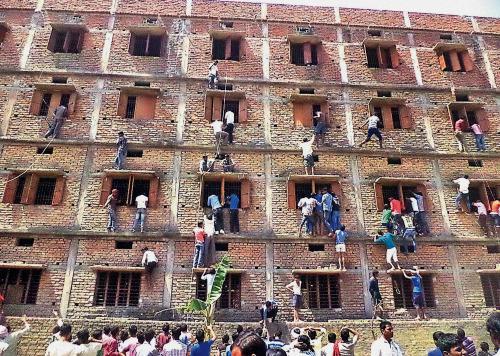Posted Sunday, March 22 2015 at 11:40
the citizen, tanzania
IN SUMMARY
CCM
has a dilemma—whether to let Lowassa and his allies go ahead and win
the presidency or eliminate him on technical grounds the same way it did
with another former premier, Mr John Malecela, in 2005.
As
the battle for the Kikwete Succession heats up within the ruling party,
Chama Cha Mapinduzi, former Prime Minister Edward Lowassa is shaping up
as the man to watch, so much so that the new development is threatening
to tear apart one of Africa’s oldest political parties.
CCM
has a dilemma—whether to let Lowassa and his allies go ahead and win
the presidency or eliminate him on technical grounds the same way it did
with another former premier, Mr John Malecela, in 2005.
To
his political foes, Lowassa is a risky choice for president for one
simple reason—he may take advantage of that position to take revenge on
his rivals, considering what transpired in the infamous Richmond
scandal.
Mr
Lowassa himself has strongly denied claims that he harbours such
intentions and insists that his resignation in February 2008 was
designed to save the government and was all about taking political
responsibility for events under his watch.
Given
the extent to which Mr Lowassa’s candidacy divides the ruling party,
the big question is whether his name can get past the Central Committee.
Mr
Lowassa, once a political ally of President Kikwete, set up a ruthless
campaign in 2005 that only earned him more political enemies. He was
then forced to resign in February 2008 after a committee led by Dr
Harrison Mwakyembe tabled the report on the Richmond scandal in
Parliament.
After
his dramatic resignation, political pundits thought his political
career was dead in the water. But seven years later, Mr Lowassa has
rejuvenated politically and commands support within the CCM’s National
Executive Committee and General Congress.
The
greatest fear within the ruling party is whether the Central Committee
will eliminate the former premier for alleged violation of the party’s
rules. Mr Lowassa is among the CCM cadres who were banned for a year in
February, 2014 after he was accused of starting his campaign for the
presidency ahead of the authorised time.
The
ban, which Lowassa allies dismiss as a smear campaign to stop him
winning the race, expired in February only to be extended by the Central
Committee on the grounds that the final report was still not ready.
Speculation
is rife within and outside the ruling party that Mr Lowassa will be
eliminated by the Central Committee in much the same way Mr Malecela was
pushed out in 2005.
Those
who fear that the Central Committee will get rid of Mr Lowassa cite
recent events within CCM—including the ban imposed on him, the attempt
in 2011 to expel him from the party allegedly because of corruption and
the rift reportedly growing between him and his former boss, ally and
friend—President Kikwete.
In
2005, when Mr Lowassa strongly backed his friend President Kikwete, the
two were dubbed Boys Two Men because of their strong political union
that eventually enabled the current President to defeat all his key
rivals within the ruling party.
Besides
Mr Lowassa, there was Rostam Abdul Rasul Aziz—Tanzania’s second richest
man, a media mogul and above all a politician—who was one of the brains
behind the Kikwete victory within and outside the ruling party.
Mr
Aziz was, among other things, responsible for planning and
co-ordinating the strong media campaign against those viewed as possible
threats to Mr Kikwete’s candidacy in 2005—including Dr Salim Ahmed
Salim and former Premier Frederick Sumaye.
According
to reliable sources, Mr Aziz was also responsible for seeking funds for
Mr Kikwete’s campaign. African Analysis, which is published in London,
claimed that Mr Aziz raised funds from Oman in March 2005 for Mr
Kikwete’s campaign—allegedly in anticipation of lucrative tenders once
the election was over.
Angered
by these allegations, President filed a civil case in London on the
grounds that his image has been highly tarnished by the article
published by the magazine that was closely linked to Dr Salim. It is not
clear what became of that case.
The
political union between President Kikwete, Mr Lowassa and Mr Aziz came
under fire by the Dr Mwakyembe-led committee which, besides implicating
Mr Aziz as one of the forces behind the Richmond scandal, asked Mr
Lowassa to assess the allegations levelled against him—and take
appropriate action.
Mr Lowassa maintains that he did nothing wrong but chose to resign for the good of his party and the government.
Mr
Lowassa says he is ready to tell his side of the story publicly should
his rivals bring up the Richmond scandal as one of the key issues to
block his candidacy. If he did decide to tell his version of the story,
it would be the first time Tanzanians would find out exactly what
happened.
Mr
Lowassa’s camp worries about whether their candidate would pass the
Central Committee’s test but it is willing to stage a fierce political
battle within the National Executive Committee should the Central
Committee drop him from the list of preferred candidates.
The
National Executive Committee is superior to the Central Committee and
that is why some of Mr Lowassa’s supporters believe attempts to
eliminate their candidate would set off a titanic battle.
Some
analysts within the party also warn that any unjustifiable elimination
would lead to a political rift that would eventually cost CCM dearly
ahead of the October 2015 election.
No
sitting president in the past two decades has managed to influence the
party during the process to pick the CCM’s presidential candidate, but
there are those who believe that President Kikwete holds the veto in
this year’s election.
In
2010, President Kikwete outsmarted his political rivals by planning and
influencing the nomination of Dr Ali Mohamed Shein as the presidential
candidate for CCM in Zanzibar
The preferred candidate then was the current Vice President of the Union, Dr Mohammed Gharib Bilal.
Will the Zuma-Mbeki drama come to Tanzania?
Mr
Lowassa’s dramatic resignation, though celebrated by his political
rivals and foes, marked the beginning of politics of hate, divisions and
smear campaigns within the ruling party.
Mr
Lowassa, who suffered humiliation the day the Richmond report was
tabled in Parliament in February, 2008, is today a newly reborn force
that is giving his political rivals a headache. A few days after his
dramatic resignation, which set off a political storm, President Kikwete
summed up what had happened as a political accident—and insisted that
Mr Lowassa simply took political responsibility for the problem but that
did not mean he was guilty.
It
is not clear whether President Kikwete still believes that what
happened to Mr Lowassa was just a political accident but, judging by
what transpired within the ruling party under his watch after the 2010
general election, it is pretty obvious that President Kikwete’s
political views on Mr Lowassa may have changed drastically.
What
puzzles political pundits is how Mr Lowassa, a man written off by many
after his dramatic resignation in 2008, bounced back with very strong
political support within and outside the ruling party. Between 2008 and
2010, inviting Mr Lowassa as your guest of honour at any official
function, especially involving fund raising, would have attracted the
wrath of the general public—thanks to the Richmond scandal.
After
his resignation, the biggest debate of the day was whether this was the
end of Mr Lowassa’s political career or the beginning of it. Some
analysts thought that it was too soon to dismiss the man who played a
crucial role in sending President Kikwete to State House in 2005, while
others said it was impossible for Mr Lowassa to bounce back because the
so-called Richmond scandal had severely damaged his reputation— and
presumably ended his political career abruptly.
But
one analyst later on wrote in 2009 that those dismissing Mr Lowassa
should take a close look at what was happening in South Africa, where Mr
Jacob Zuma, a man who was forced to resign in 2004 after he was
implicated in an arms scandal and rape accusations, bounced back three
years later, defeating President Thabo Mbeki and conquering the soul of
the ruling party—Africa National Congress (ANC).
Today,
should Mr Lowassa succeed in his race to State House, it would be a
replica of what happened in South Africa between Mr Zuma and Mr Mbeki.
Mr Zuma, who was earlier dismissed and ruled out of active politics,
fought hard to clear his name in the rape accusations. He then struggled
with corruption allegations in relation to the arms scandal after his
financial adviser, Shabir Sheikh, was jailed.
Reporting
on the 2007 Polokwane victory, The Guardian (UK), summed it this way:
“Jacob Zuma, the populist politician, humiliated President Thabo Mbeki
with a sweeping victory in the election for leader of the governing
African National Congress yesterday…Zuma, who survived a rape trial and
his dismissal as the country’s deputy president by Mbeki over corruption
allegations, took 60 per cent of the nearly 4,000 votes at the party’s
national conference in a dramatic political comeback.
“His
victory potentially opens the way for him to become South Africa’s next
president at the 2009 general election if he is not blocked by a
long-standing graft investigation. The vote amounted to a repudiation of
Mbeki, a man who has dedicated his life to the ANC but who was seen as
increasingly authoritarian, power hungry and out of touch with ordinary
South Africans.”
How
Mr Zuma rose from dust to become South Africa’s third post-apartheid
president is story that has been retold in many narratives but could
well be what is happening within the ruling party in Tanzania—especially
where Mr Lowassa is concerned.





